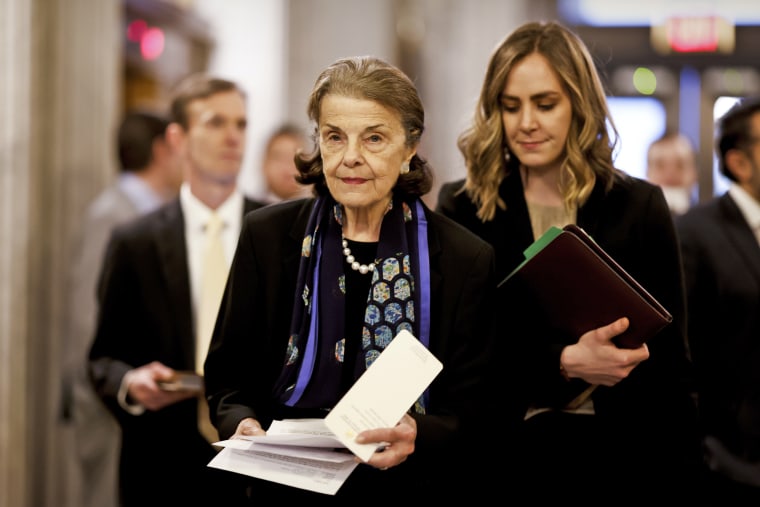In a single tweet this week, Rep. Ro Khanna, D-Calif., ignited a debate about Sen. Dianne Feinstein, D-Calif., when he called for the 89-year-old senator to resign from office for being unable to serve in Washington after being hospitalized for shingles.
It’s a debate that combines practical questions about Feinstein’s ability to do her job — along with local politics, conflict between Democratic progressives and moderates, and charges of sexism.
“I think there’s a lot of complicating factors that play here, including gender,” Democratic strategist Jennifer Palmieri said on MSNBC’s “Andrea Mitchell Reports” on Thursday.
Let’s start with the local politics. Khanna has endorsed Rep. Barbara Lee, D-Calif., in the competitive primary for Feinstein’s seat that also includes Reps. Katie Porter and Adam Schiff — after Feinstein previously announced she wouldn’t seek re-election next year.
And Lee could potentially get a boost in the primary if Gov. Gavin Newsom taps her to serve the remainder of Feinstein’s term. (Newsom has promised to appoint a Black woman to fill any U.S. Senate vacancy.)
Also, with the reporting that the 76-year-old Lee might serve just one term and be a transitional candidate if she wins, her victory could open up that Senate seat for the 46-year-old Khanna or any other California Democrat after 2030. (Lee’s camp later walked back the idea that she would serve only one term.)
Khanna denies that politics played a role in his call for Feinstein to resign.
“Well, as you know, I’m not running for the United States Senate,” he said Thursday on Fox News. “I’m happy in the House of Representatives. I don’t see any political advantage to it. The governor would get an appointment. He may appoint a caretaker... This has to do with the simple principle that California deserves a senator who is actively participating in the votes.”
Then there’s the ideological dynamic here between progressives (like Khanna) and moderates (like Feinstein).
Indeed, compare the near-universal praise from Democrats and progressives on Twitter when Sen. John Fetterman, D-Pa., checked himself into a hospital for clinical depression after suffering a stroke the previous year, versus the criticism that Feinstein has received over her absence.
Fetterman plans to return to the Senate next week. By contrast, Feinstein’s eventual return is unclear. Still, a notable difference between the two situations is the goodwill from the left that Fetterman has built, compared with progressives’ complaints about Feinstein — even before her hospitalization.
And then there are the charges of sexism — why Feinstein has been asked to resign when older and/ailing men haven’t heard the same calls.
Here was former Speaker Nancy Pelosi, who has endorsed Schiff in California’s Senate primary: “It’s interesting to me. I don’t know what political agendas are at work that are going after Sen. Feinstein in that way. I’ve never seen them go after a man who was sick in the Senate in that way,” she said, appearing to refer to Fetterman, Senate Minority Leader Mitch McConnell (who returns to the Senate next week after suffering a concussion) and former Sen. Thad Cochran, R-Miss.
But Khanna dismisses that complaint.
“I respect Speaker Pelosi. This has nothing to do with gender,” Khanna said Thursday on Fox News. “I know she’s very much for Adam Schiff getting that seat, but I don’t question people’s political motives. This is simply about whether someone can do their jobs.”
And it’s Feinstein’s day job — particularly in her role on the Senate Judiciary Committee — that’s garnered additional attention in this case, with Democrats’ desire to confirm as many judges as possible with their narrow Senate majority.

